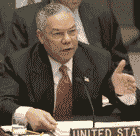米国のコリン・パウエル国務長官が国連安保理に出したイラクの大量破壊兵器に関する状況証拠について、英国のタイムズ紙が非常に興味深い記事を出した。以下はその概要を伝える日刊スポーツ紙の記事である。(朝日新聞、読売新聞、毎日新聞にも掲載されている)
パウエル演説がパクリだった 【ロンドン7日=鈴木雅子通信員】 イラクの大量破壊兵器開発の「証拠」の1つとして、パウエル米国務長官が、先の国連安全保障理事会演説で引用した英情報機関MI6の「機密文書」が、実はイラク系米国人の大学院生が書いた論文の丸写しだったことが分かった。 米国がイラク攻撃を正当化するために突き付けた「証拠」の信ぴょう性が揺らぐことになり、文書を発表した英政府のお粗末な対応に「言語道断」と、批判が噴出している。 英紙タイムズなどによると、パウエル長官が演説で引用した「機密文書」は、カリフォルニア州在住の大学院生イブラヒム・マラシ氏(29)が、12年前の湾岸戦争時の情報を基にして書き、中東情勢専門誌に発表した論文からの“盗作”だった。パウエル演説後、ケンブリッジ大の研究者らの指摘で発覚した。 機密文書は「イラクの隠匿、虚偽、脅迫の組織」と題され、イラク攻撃に向けて米国と歩調を合わせる英政府が、このほど発表したもの。英情報機関「MI6」による報告とされる。19ページの文書の、6ページ目から16ページ目までのほとんどが、マラシ氏の論文で、つづりや文法の間違いまで同じだったという。それだけでなく、もとの論文がイラク治安機関について「敵対政権の反対勢力を援助」と記したのを「テロ組織を支援」に、「外国大使館の監視」を「外国大使館をスパイ」と、より挑発的な表現に誇張して書き換えてあったという。 マラシ氏は、中東地域での化学兵器やミサイルの開発実態を研究。イラクに関する数多くの文献に通じており「英政府は私に情報の確証を求めには来なかったが、内容は正確なはずだ」と、今回の騒動を皮肉っている。 イラク攻撃の正当性を国際社会に主張することが目的だったパウエル演説の一部が“盗作”だったことになり、ホワイトハウスは赤っ恥をかかされたようなもの。英政府の報道官は「情報機関の機密情報だけでなく、その他の情報源にも基づくと断っている」と開き直ったが「情報の出元がどこかについては機密上言えない」と述べ、論文の丸写し疑惑自体は否定しなかった。 以下は英国のタイムズ本誌 February 07, 2003 MI6 'intelligence' lifted from lecturer's article By Elaine Monaghan in Washington and Rosemary Bennett COLIN POWELL’S much-vaunted case for war against Iraq suffered a setback yesterday when it emerged that chunks of British “intelligence” that he invoked were copied verbatim from an old article by a young academic. “I was flattered at first, then surprised that they didn’t cite me,” said Ibrahim al-Marashi, 29, an Iraqi-American who lectures on the country that his parents fled in 1968. “I’ll be more sceptical of any British intelligence I read in future,” he said in a telephone interview. “It was a case of cut and paste. They even left in my mistakes.” The academic said that he became aware of the connection with an article he wrote for the September edition of the Middle East Review of International Affairs only when a colleague from Cambridge University e-mailed him after General Powell’s presentation at the United Nations. He said he was not surprised by what the Secretary of State had to say about Iraq trying to conceal its weapons programmes because he had worked on a project at Harvard University classifying captured Iraqi documents and he had read 300,000 of them. “By no means did this invalidate Powell’s presentation,” he said, defending the US case for war. Mr al-Marashi’s family have all left Iraq, or he would have been worried about the exposure of his name. He works at the Centre for Nonproliferation Studies of the Monterey Institute of International Studies in California, where he focuses on the spread of nuclear, biological, and chemical weapons and missile technologies in the Middle East. His only complaint was that the British Government was “not playing by academic rules”. Perhaps that showed a healthy shift in intelligence practices away from “an antiquated notion” that public source material is not worthwhile. “Hopefully it marks a change in attitude,” he said. The British Government also lifted several paragraphs that Mr al-Marashi carefully attributed to a book published in 1999 by Scott Ritter, the former chief UN weapons inspector, who is vehemently opposed to war against Iraq. Mr al-Marashi confirmed a Channel 4 account concerning six paragraphs on Saddam’s Special Security Organisation which contained the exact same wording as his paper. It contained straight lifts from the text. He wrote: “The head of military intelligence generally did not have to be a relative of Saddam’s immediate family, nor a Tikriti. Saddam appointed, Sabir Abd Al-Aziz Al-Duri as head . . .” The Downing Street version kept the misplaced comma after “appointed”: “Saddam appointed, Sabir ’Abd al-’Aziz al-Duri as head during the 1991 Gulf War.” The accusations are not only embarrassing for Tony Blair but also for the White House. “This document is clearly presented to the British public as a product of British intelligence and it is clearly nothing of the kind,” Dan Plesch, a senior research fellow at the Royal United Services Institute, said. “This appears to be obsolete academic analysis dressed up and presented as the best MI6 and our international partners can produce on Saddam.” A Downing Street spokesman dismissed the allegations and said that he stood by the dossier. “As the report itself made clear, it was drawn from a number of sources, including intelligence material,” the spokesman said. “It does not identify or credit any sources but neither does it claim exclusivity of authorship. We consider a text, as published, as accurate.” 以下は盗用された著者のプロフィール Ibrahim al-Marashi is a research associate at the Center for Non-Proliferation Studies in Monterey, California as well as a lecturer at the US Naval Postgraduate School. He is currently working on a project on Iraqi intelligence operations in northern Iraq and Kuwait. |
|||||
